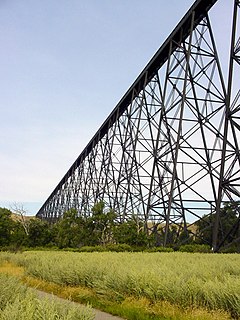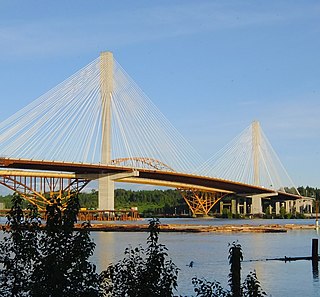
A cable-stayed bridge has one or more towers, from which cables support the bridge deck. A distinctive feature are the cables or stays, which run directly from the tower to the deck, normally forming a fan-like pattern or a series of parallel lines. This is in contrast to the modern suspension bridge, where the cables supporting the deck are suspended vertically from the main cable, anchored at both ends of the bridge and running between the towers. The cable-stayed bridge is optimal for spans longer than cantilever bridges and shorter than suspension bridges. This is the range within which cantilever bridges would rapidly grow heavier, and suspension bridge cabling would be more costly.

The Second Severn Crossing —officially renamed the Prince of Wales Bridge —is the M4 motorway bridge over the River Severn between England and Wales, inaugurated on 5 June 1996 by the Prince of Wales to supplement the traffic capacity of the Severn Bridge built in 1966. The bridge is operated by Highways England. In 2018 the bridge was renamed the Prince of Wales Bridge.

The Goethals Bridge is the name of a pair of cable-stayed bridge spans connecting Elizabeth, New Jersey, to Staten Island, New York, in the United States. The spans cross a strait known as Arthur Kill, and replace a cantilever bridge span built in 1928. The bridge is operated by the Port Authority of New York and New Jersey.

The Lethbridge Viaduct, commonly known as the High Level Bridge, was constructed between 1907–1909 at Lethbridge, Alberta, Canada at a cost of $1,334,525.

The Pierre Laporte Bridge is the longest main span suspension bridge in Canada. It crosses the Saint Lawrence River approximately 200 metres (660 ft) west (upstream) of the Quebec Bridge between Quebec City and Lévis, Quebec. It is the longest non-tolled suspension bridge in the world.

The Thousand Islands International Bridge is an American-maintained international bridge system over the Saint Lawrence River connecting northern New York in the United States with southeastern Ontario in Canada. Constructed in 1937, with additions in 1959, the bridges span the Canada–US border in the middle of the Thousand Islands region. All bridges in the system carry two lanes of traffic, one in each direction, with pedestrian sidewalks.
Route 2 is a major provincial highway in the Canadian province of New Brunswick, carrying the main route of the Trans-Canada Highway in the province and a core route in the National Highway System. It is a 4-lane freeway in its entirety. The highway connects with Autoroute 85 at the border with Quebec and with Highway 104 at the border with Nova Scotia, as well as traffic from Interstate 95 via the Route 95 connector. Route 2 directly serves the cities of Edmundston, Fredericton and Moncton.

The Interstate Bridge is a pair of nearly identical steel vertical-lift, "Parker type" through-truss bridges that carry Interstate 5 traffic over the Columbia River between Vancouver, Washington and Portland, Oregon in the United States.

King's Highway 420, commonly referred to as Highway 420, is a 400-series highway in the Canadian province of Ontario that connects the Queen Elizabeth Way (QEW) with downtown Niagara Falls. It continues east as a limited-access expressway named Niagara Regional Road 420 to connect with the Rainbow Bridge international crossing between Canada and the United States over the Niagara River; this was part of Highway 420 until 1998. West of the QEW, the freeway ends at an at-grade intersection with Montrose Road. The highway has a speed limit of 80 kilometres per hour (50 mph), making it the only 400-series highway to have a speed limit less than 100 kilometres per hour (62 mph) for its entirety.

The Mezcala Bridge, is a cable-stayed bridge located in the state of Guerrero on Highway 95D in Mexico. It spans the Balsas River close to the western Pacific coast of the country. This bridge, with a total length of 891 m (2,923 ft) and six uneven spans completed in 1993, has been in service since 1994 as a toll bridge.

The Port Mann Bridge is a 10-lane cable-stayed bridge that opened to traffic in 2012. It is currently tied for the longest cable-stayed bridge in North America with the Bay Bridge in California.

The Princess Margaret Bridge, sometimes called the Princess Margaret Rose Bridge or shortened to just PMB, is a two-lane highway bridge crossing the Saint John River at Fredericton, New Brunswick, Canada. It is named after Queen Elizabeth II's sister Princess Margaret, Countess of Snowdon.

The Saint John Harbour Bridge is three-span crossing of Saint John Harbour at the mouth of the Saint John River in Saint John, New Brunswick, Canada. It opened in 1968.
The Jemseg River Bridge is the name for two different structures currently crossing the Jemseg River in Jemseg, New Brunswick, Canada.

The Clair–Fort Kent Bridge is a steel truss bridge crossing the Saint John River between Clair, New Brunswick in Canada and Fort Kent, Maine in the United States.

An extradosed bridge employs a structure that combines the main elements of both a prestressed box girder bridge and a cable-stayed bridge. The name comes from the word extrados, the exterior or upper curve of an arch, and refers to how the "stay cables" on an extradosed bridge are not considered as such in the design, but are instead treated as external prestressing tendons deviating upward from the deck. In this concept, they remain part of the main bridge superstructure.

The Magaguadavic River is an historic Canadian river located in the province of New Brunswick.
Route 105 is a collector highway in New Brunswick running from Route 10 in Youngs Cove to Route 108 in Grand Falls, mostly along the east and north banks of the Saint John River, over a distance of 307.0 kilometres (190.8 mi). Route 105 consists largely of former alignments of Route 2 and runs parallel to Route 2 over its entire length.

The Tower Bridge is a vertical lift bridge across the Sacramento River, linking West Sacramento in Yolo County to the west, with the capital of California, Sacramento, in Sacramento County to the east. It was previously a part of U.S. Route 40 until that highway was truncated to east of Salt Lake City. The bridge is maintained by the California Department of Transportation as part of State Route 275 and connects West Capitol Avenue and Tower Bridge Gateway in West Sacramento with the Capitol Mall in Sacramento.

The Samuel De Champlain Bridge, colloquially known as the Champlain Bridge, is a cable-stayed bridge designby architect Poul Ove Jensen and built to replace the original Champlain Bridge over the Saint Lawrence River in Quebec between the Island of Montreal and the South Shore suburbs. The new span is located just north of the original Champlain Bridge, which is currently being demolished. The new bridge carries eight lanes of automobile traffic of the A-10, A-15, and A-20, with one lane in each direction dedicated for buses. It also includes a multi-use lane for cyclists and pedestrians. The central portion of the bridge deck, still under construction, will carry the South Shore branch of the forthcoming Réseau express métropolitain (REM) automated light rail system. At 60 metres (200 ft) wide, the new Champlain Bridge is the widest cable-stayed bridge in the world that uses two planes of cables.

















